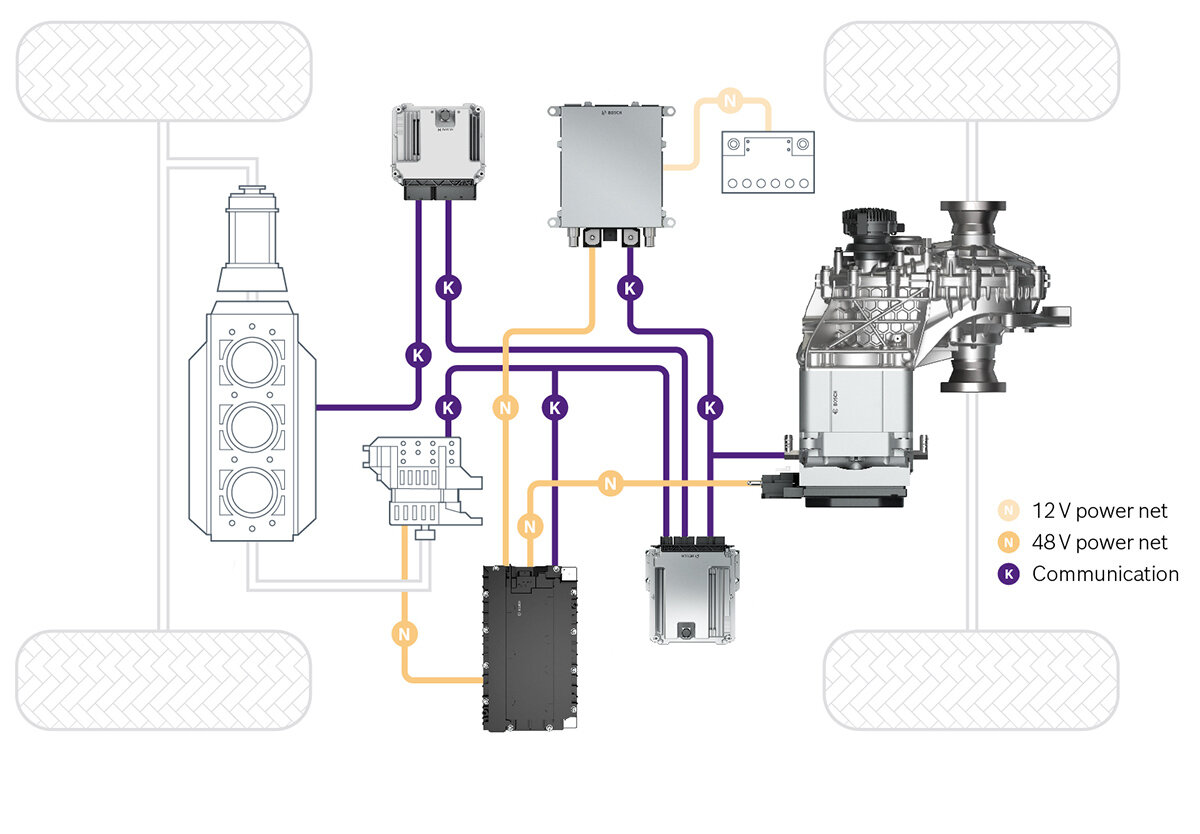Marine Technology and Innovation: Batteries, Power and Mild Hybrid Systems
With the incredible progress of electric vehicles on the market, the obvious assumption is that very soon we will see more electric outboards and other electric offerings. But it’s not true. Similar to the automotive industry, early electric marine solutions are less than inspiring and cost prohibitive. Electric motor advantages like obscene torque and unbelievable RPM range with a simple motor is compelling for marine use but the battery remains a huge challenge. Range, weight, charging and cost make a large battery less than effective in a marine environment. But, one thing we see in automotive that has flourished in the last couple years is mild hybrid systems. This type of hybrid uses a 48 volt battery electric system to help the combustion engine, increasing performance, improving efficiency; while being a cost effective solution. A mild hybrid system could be an incredible way to take marine engines to the next level in power and performance.
Virtually every major car manufacturer has adopted a mild hybrid system for their cars. Essentially, for a small increase in cost, a 48 volt system aids the engine on take off, load, shut off at idle and can utilize brake regeneration for power. In a boat, the key benefits of using a mild hybrid system would be the efficiency of adding electric motor assist on take off and acceleration, reducing strain on the engine, avoid power loss from accessories, and accomplish this without adding significant complexity or cost. Let’s look at a few features that make a mild hybrid compelling for marine use.
Bosch is one of the leaders in the 48V Mild Hybrid technology systems. This infographic shows how it functions in automotive use. Mild hybrid systems are not overly complex. (from bosch.com)
First off, some people might associate the mild hybrid with economy cars, but in actual fact, different hybrid systems are utilized in the highest performance cars on the road, from Porsche, Mercedes AMG, McLaren, Audi and Ferrari. For a marine engine, constantly under load, a mild hybrid can be called upon when the boat is under hard acceleration and when planing, reducing the strain on the gas engine. To that affect, the overall efficiency is much improved and the electric augmentation is like adding a supercharger with no parasitic loss. Increasing the torque by 15% in short spurts suits the marine environment. Slow moving and docking could be another added benefit, but not as critical.
The guts of the system is a 48 volt battery. Because of the advantages of going with a higher voltage system, the engines do less work overall when it comes to powering systems on the boat. Modern 48 volt battery systems for leading companies like Bosch, Continental and Delphi are small in shape, like a shoe box, and weigh less than 50 pounds. Because the system replaces the starter and alternator, there is a simplification and reliability improvement without adding complexity. Other systems can also be powered by the electric motor, removing accessory belts as an example. Mild hybrids remove the water pump and A/C compressor so there are no belt at the front of the engine.
The Continental 48 Volt 30 KW motor is tiny and can add tons of extra power to combustion engine. (From continental.com)
If you took a 300 HP outboard and added a mild hybrid system, you could effectively add about 15 to 20% more power while improving fuel consumption. A 300 would be a 350+ HP equivalent potentially. I do like the analogy that it is like adding a free supercharger. Horsepower is one thing, but the torque added is incredible. For Mercedes, they started using a mild hybrid on their AMG 53 cars and the 3.0 straight six produces 435 HP, which is a 21 HP improvement, but the torque is increased by 184 Lb/ft. That is substantial. The AMG system uses a “Integrated Starter Generator” mild hybrid system.
The Mercedes AMG 53, 3.0L straight six is a compact powerhouse due to the mild hybrid system. Mercedes calls it an Integrated Starter Generator. (photo credit (mercedes-amg.com)
There are a few full electric marine options currently on the market and like already stated, they are not very compelling, are used in low performance applications and are prohibitively expensive. You could argue they work as low speed cruisers to allow range to be acceptable but that’s about it.
Mild hybrid systems could be a game changer for marine engines of all types. When you think about the specific performance increase by adding an electric motor assist to the gas engine, while making the engine more efficient without parasitic loss; it makes so much sense. Marine lags automotive from a technology perspective, and mild hybrids are now common offerings for all auto manufacturers.
More power is difficult to make sometimes. Mercury Racing can increase the boost and RPM range of the 4.6L 450R to make more power but that comes at a cost, especially on efficiency. Mild hybrids can add significant torque on all engines, including forced induction ones.
We just aren’t there yet. Torqeedo has multiple different power options, but the challenges remain. This a small cruiser from ZIN Electric boats.
Originally posted on May 14, 2020











